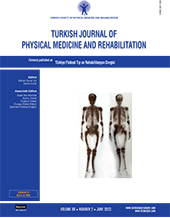Evaluation of the effects of robot-assisted gait training on bowel function in children with cerebral palsy and the caregiver burden: A pilot study
Patients and methods: This retrospective pilot study was conducted with 30 children (16 males, 14 females; mean age 8.8±3.2 years; range, 6 to 11 years) with CP between January 2019 and July 2019. Patients were equally divided into two groups: the RAGT group and the control group. Both groups underwent conventional physical therapy. The RAGT group underwent RAGT in addition to physical therapy. The results of the Bristol Stool Scale, the Constipation Assessment Scale, and the frequency of defecation before and after the study were recorded. Caregivers of children in both groups were asked to answer five questions regarding their burden at the beginning of the study and the end of the study.
Results: While a significant improvement was found in defecation frequency in the RAGT group (p=0.01), defecation frequency was not significantly improved in the control group (p>0.999). Bristol Stool Scale scores changed significantly within both groups (p<0.05). Constipation Assessment Scale scores significantly changed only in the RAGT group (p=0.01). A significant positive change in caregiver burden was observed in the RAGT group (p<0.05).
Conclusion: Robot-assisted gait training has positive effects on the frequency of defecation, stool consistency, and constipation severity in children with CP and caregiver burden.
Keywords : Caregiver burden, cerebral palsy, constipation, rehabilitation

















